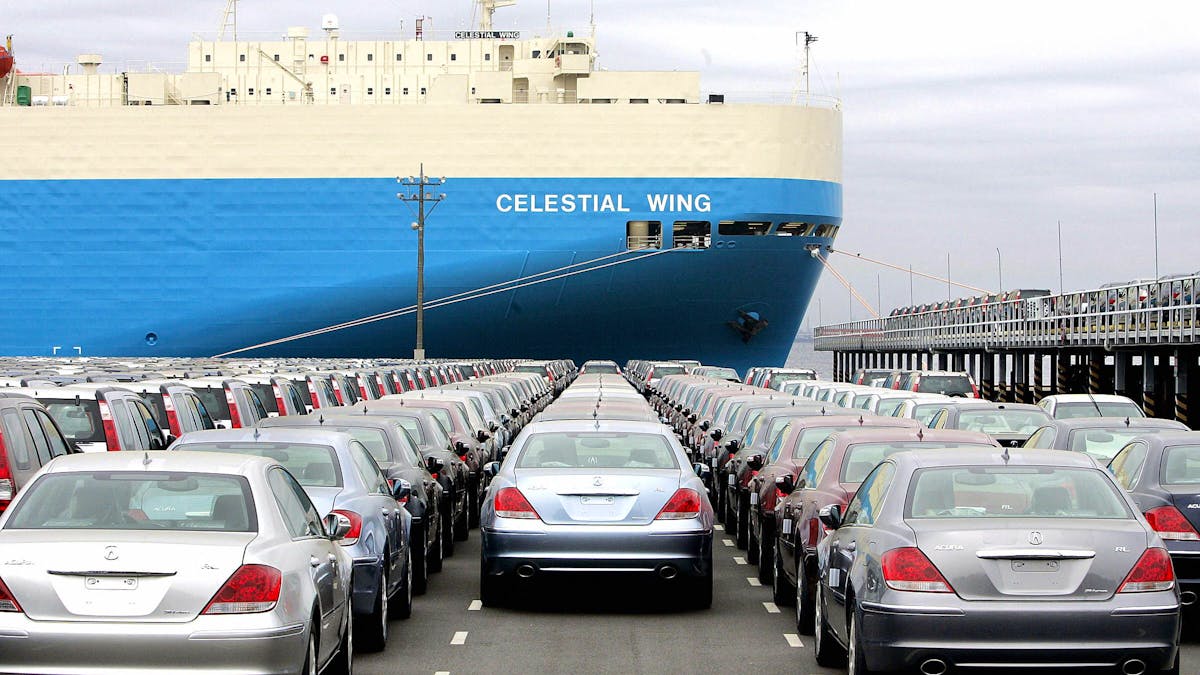President Trump’s desire to impose punitive taxes on imported cars in the United States next week, the stupor of its business partners and strikes the prospects of the entire sector on Thursday.
Donald Trump announced that it would impose on April 3 25% additional customs duties not only on cars made outside the United States, but also on the spare parts that make up vehicles assembled on American soil.
A reaction cascade
This perspective sparked a cascade of reactions. Breeding, the Federation of German car manufacturers, a big providers of luxurious sedans for the American market, spoke of a “fatal signal for free trade”. Berlin called on the European Union to a “firm” reaction. And Paris, by the voice of President Emmanuel Macron, “hopes (…) that President Trump will be able to return to this decision”. For Tokyo, “all the options are on the table” now. Canadian Prime Minister Mark Carney denounced “a direct attack”. And Mexico said they seek “preferential treatment” to avoid such a cleaver.
“We are going to charge the countries that do business in our country and take our wealth,” justified the American president, a new illustration of his punitive manner of customs duties since his inauguration at the end of January.
America also affected
The announcement caused the actions of car manufacturers and equipment manufacturers from one end of the planet to the actions. American companies are also concerned, their economic model largely integrating Mexico and Canada where they have factories.
At the opening of Wall Street, General Motors dropped by almost 8%. Ford released 1.71%, while Stellantis fell 3.60%.
In a joint statement, these manufacturers said it was “crucial” that customs duties did not “set up prices for consumers”, and pleaded for the “competitiveness” of “North American” automotive production, therefore integrating Canada and Mexico.
The Tesla brand also impacted
Even Elon Musk, a close ally of Donald Trump and Tesla boss, fears to leave feathers. The new customs duties will have a “significant” effect on the cost of production of the Tesla, via imported spare parts, according to him.
This new tax on a consumer product marks a new escalation in the trade war led by Donald Trump against the main partners of the United States, with customs duties as a main weapon.
He has notably imposed 25% of imported steel and aluminum taxes. He also announced, by largely referring their application, customs duties of 25% on all goods from Mexico and Canada.
He also singularly noted customs duties on Chinese products. Europe, which he has accused of having been “designed to enter the United States”, is also in the crosshairs.
“Reciprocal customs duties”
The next stage of this offensive is scheduled for Wednesday, April 2, that Donald Trump calls for the “Liberation Day”. The American president should then detail his plan concerning what he calls “reciprocal customs duties”, which will potentially concern all the products imported into the United States.
“They tax us, we tax them” at the same level, has already sketched the head of state. Donald Trump also threatened Brussels and Ottawa with customs duties that were still weighed down if they came from coordinating their response.
“If the European Union is working with Canada to harm economically in the United States, large-scale customs duties, much larger than those currently planned, will be imposed on them,” he wrote on his Truth Social network on Thursday.
Abouts if …
Faithful to his transactional approach to international relations, Donald Trump also suggested on Wednesday at China Toussounes on taxes, if an agreement was reached for the sale of American activities in Bytedance, Chinese mother house of the Tiktok social network, threatened with ban in the United States.
Beijing opposed an end to inadmissibility on it on Thursday.
“Regarding Tiktok’s question, China has expressed its position on several occasions. China’s position against the taxation of additional customs duties is also consistent and clear, “said Guo Jiakun, spokesperson for the Chinese Foreign Ministry.

